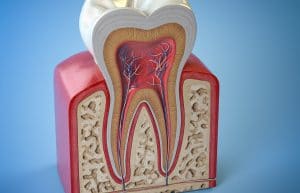 Most people connect the term tooth decay with cavities and tooth fillings. That’s because cavities, which are depressions that decay causes to form in your tooth structure, are common, and fillings are the often the best way to treat them. However, tooth decay takes on a far more serious connotation when it’s allowed to progress into its more severe stages. Instead of just filling a cavity, treating more severe tooth decay can require thoroughly cleaning and restoring the inner chambers of your tooth – a process known as root canal treatment.
Most people connect the term tooth decay with cavities and tooth fillings. That’s because cavities, which are depressions that decay causes to form in your tooth structure, are common, and fillings are the often the best way to treat them. However, tooth decay takes on a far more serious connotation when it’s allowed to progress into its more severe stages. Instead of just filling a cavity, treating more severe tooth decay can require thoroughly cleaning and restoring the inner chambers of your tooth – a process known as root canal treatment.
The earliest stages of tooth decay
Tooth decay is an infection in your tooth that’s caused by harmful oral bacteria (the building blocks of dental plaque). Before this occurs, bacteria buildup on your teeth (plaque and tartar) become excessive, and some of them release harmful substances that erode your tooth enamel. This is known as enamel erosion, and is the first step in the decaying of your tooth structure. Once your enamel is compromised, the bacteria can more easily reach the main part of your tooth, called the dentin, and lead to increasingly more severe decay.
Neglecting to treat a cavity soon enough
When bacteria infect your tooth structure, they leave a depression in their wake known as a cavity that grows larger over time. The mild to moderate level of decay in common cavities can often be addressed in a minimally invasive manner, such as with a tooth-colored filling. This not only alleviates any discomfort your cavity is causing, but also restores and protects the tooth from further decay. However, if you wait too long to fill your cavity, the decay may infect more than just your tooth’s dentin. If it reaches the pulp at the center of your tooth, it will also infect the nerves and blood vessels that run from the pulp to your jawbone through its root canal.
Saving your tooth with root canal treatment
Root canal treatment is designed to address severe levels of tooth decay, where bacteria and infection have reached the pulp and root canal of your tooth. The procedure involves carefully accessing the tooth’s inner pulp and root canal, then thoroughly removing the infected tissues and tooth structure to sanitize the tooth. Then, we can fill the root canal and pulp with strong, biocompatible material to restore the tooth and root’s structural integrity. For optimal results, we may cap the tooth with a dental crown to ensure its continued protection in the future.
Learn more about root canal treatment
Root canal treatment can often be avoidable, but if it isn’t, then seeking treatment as soon as possible will be essential to saving your tooth. To learn more, schedule an appointment with us by calling Dreem Dentistry in Leawood, KS, today at 913-681-5500. We also serve patients who live in Overland Park and all surrounding communities.






